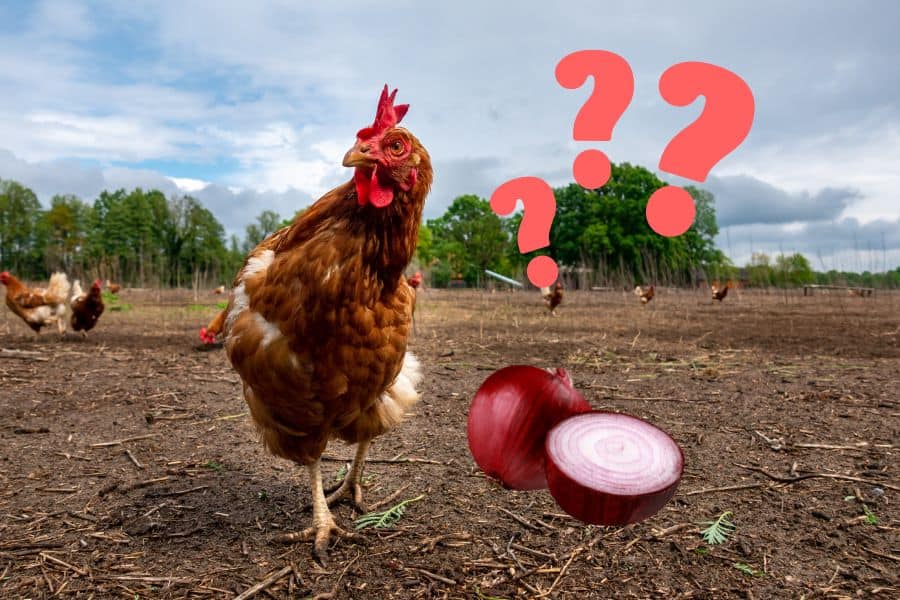As omnivores, chickens are known to consume a large variety of foods including vegetables. However, when it comes to onions, hobbyists, and keepers have some debate on whether you should add onions to your chicken’s diet.
The debate ranges from which forms of onions (raw or cooked) you should feed the chicken to the type of onions (peeled onions, green or red). Some believe that a few pieces of onions are of no harm while others advise against even the tiniest exposure.
All of this boils down to the fact that onions contain potentially harmful compounds that can be poisonous to the chicken. Some of the effects include general weakness but can also lead to severe cases including death.
In this article, we will explore the biochemical compositions of onions and how chickens react to them. We will also dive into the various reasons why chickens eating onions is such a debatable topic to help you make an informed decision on the matter.
Can Chickens Eat Onions: How Onions Affect Chickens
In general, chickens can eat onions provided the onions are not part of the chicken’s diet and are eaten in moderation. There are no scientific studies that point to onions being toxic to your chicken, most claims are speculative and based on a case-by-case basis.
Chickens are omnivorous farm animals that feed on many things they can find on the ground. In fact, one backyard chicken can consume up to 1.6 pounds of household food scraps in a single week.
Chickens are natural scavengers that will feed on any foods they find laying around including leftovers, plant matter, and insects.
This means that their digestive system can handle a lot of biochemical compounds that would often endanger animals like dogs and cats.
The idea that chickens cannot eat onions is popular partly because onions are toxic to many animals including dogs, and cats.
After about 24 hours of a dog eating onions, several symptoms will be visible including vomiting, lethargy, sore abdomen, dehydration, diarrhea, and loss of appetite.
Allium is a genus of flowering plants consisting of about 500 species including onions, garlic, leeks, chives, shallots, and scallions. They are characterized by a pungent onion or garlic smell which often leaves a bad smell in the animals that eat them raw.
Allium vegetables contain certain compounds that can be potentially harmful to household animals. Some of these toxins include disulfides and thiosulfates. Onions are a good example known to contain a substance called N-propyl disulfide.
This compound induces the breakdown of red blood cells, leading to a condition known as anemia. The toxin in onions exerts its effects by initiating oxidative damage (oxidative hemolysis) to the red blood cells.
It binds to the oxygen molecules within these cells, thereby diminishing their capacity to transport oxygen. This affects the hemoglobin (proteins in red blood cells responsible for oxygen transportation) and turns them into Heinz bodies.
The immune system misidentifies the affected blood cells as foreign entities, triggering their destruction through a process called hemolysis. Consequently, this sequence of events ultimately results in the development of hemolytic anemia.
All of this happens in dogs and cats when they eat onions.
Chickens however do not portray any of the said symptoms when they eat onions. This is because they are among the least susceptible animals to onion poisoning. Cattle and cats are the most easily affected while sheep and goats are the most resistant of all domesticated animals.
The chicken’s body, much like the human body is built to fend off invasive substances and any toxic element that threatens its life. In so doing, onions may be fatal to the life of your chicken but most chickens end up fighting the effects off rendering the onions non-lethal.
Dogs and cats are not so lucky since they are incredibly sensitive to toxic attacks on their blood cells. If you have ever been to a vet with your cat or dog then you may have a clue as to how adamant the vets are about keeping onions away from the animals.
As a general rule, diets with more than 25% dry matter of onion will tend to cause clinical anemia in animals that suffer from onion intoxication. Keeping the onion dry matter below 25% will ensure that your chickens are not poisoned when eating onions.
Symptoms of Onion Intoxication in Chickens
To make it clear, onions do cause oxidative damage to the red blood cells in chickens as well. However, chickens are not hypersensitive to this effect and will not exhibit most of the symptoms you may notice in cats and dogs. If symptoms become visible, they are often temporary and short-lived.
The oxidative damage done to the chicken’s red blood cells begins within the first 24 hours of exposure. The red blood cells will start to lose their efficiency in supplying oxygen to the body and this will cause the chicken to become oxygen deprived.
Due to the non-sensitive nature of the chicken’s body, the red blood cells will heal faster than they get destroyed. However, further exposure and prolonged periods of eating onions can cause anemia problems accompanied by other severe symptoms like poor liver function.
As exposure becomes more frequent and the number of toxic compounds increases, your chicken may portray these symptoms:
- Lethargy and general weakness
- Diarrhea
- Abdominal pains
- Dizziness
- Increased sensitivity, irritation, and confusion
These symptoms will go away with time once the chicken steps away from the onions for some time. It is for this reason that onions should not be part of the chicken’s diet. This way, there are no permanent effects of chickens eating onions.
With all of this in mind, it is recommended that you do not feed your chicken more than 0.4 oz of onions so as to prevent the destructive biochemical reactions from taking hold.
Scientific Studies on Effects of Onions on Chicken
It is important to note that according to veterinary manuals like the MCD Manual (Merck Veterinary Manual), Allium toxin poisoning is not among the well-known/documented forms of poultry poisoning. Most common poisonings in poultry like chicken includes:
- Aflatoxicosis – the most common type characterized by ataxia, lack of appetite, depression, convulsions, and death. Commonly caused by eating feed contaminated with Aspergillus flavus, A parasiticus, and others.
- Ammonia poisoning
- Botulism from a bacterium.
- Calcium poisoning from excessive calcium intake
- Carbon Monoxide poisoning from fumes during transportation
- Copper Poisoning from plant feeds treated with copper sulfate additives, etc.
Also, in a 2011 study published in the Research Journal of Poultry Sciences, it was observed that the inclusion of onions and garlic in the diet did not have any detrimental effects on the health or mortality rate of the chickens.
This indicates that incorporating onions and garlic into the diet can be a safe and beneficial practice for improving the performance of broiler chickens.
The findings of the study also revealed that incorporating onions and garlic into the diet of broiler chickens had positive effects on certain performance parameters.
The inclusion of onions and garlic resulted in improved body weight gain, feed intake, and feed conversion ratio in the broiler chickens. These performance enhancements can be attributed to the bioactive compounds present in onions and garlic, such as flavonoids and organosulfur compounds.
A similar follow-up study in 2018 on the ‘Effects of Dietary Combinations of Garlic and Onion in Broiler Production’ observed that dietary supplementation with garlic and onion combinations had positive effects on broiler performance.
It also resulted in improved body weight gain, feed intake, enhanced growth, and efficient utilization of feed.
It was additionally observed that the inclusion of garlic and onion in the diet also positively influenced the immune response of the chickens. They exhibited enhanced antibody production, indicating a strengthened immune system.
This means garlic and onion may have potential immunomodulatory effects, which can contribute to the overall health and well-being of broiler chickens.
Contrary to popular belief, it is clear from these studies and the lack thereof of evidence against it, that chickens can eat onions and should have Alliums included in their diet to further improve their performance and general health.
How to Feed Onions to Your Chickens
Chickens do not naturally gravitate toward onions. They are unlikely to actively seek out flowery plants for their daily dietary needs. This means that if you want to feed onions to the chickens then you may need to be a bit creative.
It is advisable to avoid giving chickens raw onions since raw onions inevitably contain higher concentrations of harmful compounds. Therefore, cooked onions are generally considered safer for chickens to consume than raw onions.
Cooking methods such as boiling or steaming onions can help reduce the concentration of harmful compounds further. The heat alters their chemical composition, by breaking down some of the potentially harmful substances found in onions, including N-propyl disulfide, thereby affecting their presence and concentration.
However, it is crucial to note that excessive cooking may lead to nutrient loss. Onions contain various vitamins and minerals, including vitamin C, vitamin B6, and manganese, which are beneficial to the overall well-being of the chickens.
Read More:
FAQs
What Vegetables Chickens Cannot Eat?
Apart from the toxicity of the Allium plant family (onions, shallots, chives, garlic, and leeks), chickens are also susceptible to toxins in other vegetables including;
- Avocado – contains Persin which causes damage to the heart tissues in many poultry animals. Symptoms include labored breathing, high heart rate, and myocardial tissue damage.
- Citrus – contains citrus acid that increases calcium digestibility thereby affecting calcium absorption that leads to soft eggshells.
- Dry beans – causes blood clots because of the presence of hemagglutinin
- Potatoes – white and sweet potatoes are healthy for chickens but green potatoes contain solanine which is toxic to chickens.
What Are the Toxic Foods and Substances Chickens Should Avoid?
Other common foods & drinks that are poisonous to chicken include:
- Chocolate – it is as poisonous to cats and dogs as it is to chickens. It contains caffeine and theobromine which chickens cannot digest properly, thereby making them poisons.
- Tea – also contains caffeine.
- Alcohol – chickens cannot easily detoxify from alcohol like human bodies and this leads to quick organic failure.
- Fried foods – chickens do not have enzymes to break down fats easily and quickly.
Conclusion
All in all, onions are toxic to many animals but chickens have a higher tolerance and are among the least susceptible animals to onion poisoning. However, it is recommended to feed onions to chickens in moderation and not as a regular part of their diet to prevent any potential negative effects.
Please feel free to consult with a veterinarian or poultry expert to get further guidance on how to incorporate onions into a chicken’s diet safely and effectively.


